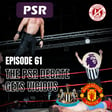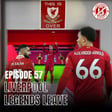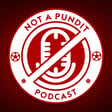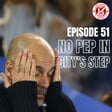Become a Creator today!Start creating today - Share your story with the world!
Start for free
00:00:00
00:00:01

The truth behind Yaya Toure's birthday cake, Angkor City and Unleashing South East Asia's football potential with Richard Harcus
Exploring the Future of Football! 🔎 Join us for an eye-opening episode with football consultant Richard Harcus, where we delve deep into the untapped potential of South Asian football. 🌟 From grassroots to the global stage, discover the incredible talent and opportunities waiting to be unleashed. 🌎
Transcript
Introduction & Welcoming Connor Glennon
00:00:00
Speaker
I'm not into podcasts. I swear you'll never see anything like this ever again. What a hit. Back of the net. Hello, hello, hello. This is the Not Upon A Podcast and I'm Killeen Ginnity. I'm delighted to be joined as always by Connor Glennon. Connor, how are we doing?
Killian Murphy's Oscar Win: A Triumph for Ireland?
00:00:21
Speaker
all good man can't complain Killian Murphy sweep the Oscars so it's all it's all good for Ireland it absolutely is and I was covering it for my day job well it was night job because it was a 1 a.m. or 2 a.m. and win and I've rolled true because we're actually doing an early record to talk with the one and only Richard Harkus of the Harkus consultancy group now how
Meet Richard Harkus of Harkus Consultancy
00:00:44
Speaker
we got in touch with Richard was via Anchor City as we interviewed Coach Pomeroy a few weeks ago. And we have been dying to do a follow up and former director of football. You had been involved in the club and now you're not. Richard, how are you doing? Yeah, not bad. Delighted to be on. Thanks very much for having me. Yeah, I'm doing good other than my injury. I mentioned earlier, but it's a lovely day here in Vietnam.
00:01:11
Speaker
But I appreciate you guys up early in the morning there in Ireland. I'm also jealous of the weather. I'm sure it's far better than it is over here. Well, it's not raining. I'll tell you that right now. I don't want to. And I think you're going to have to we're going to have to tell Connor what the injury is. Yes. So I support the greener side of Edinburgh and I pulled a muscle in my back shouting at the TV screen last night.
00:01:41
Speaker
Oh, that's a good one. That's a proper football fight. Yeah, that's like what it's, who was it again? I can't remember who it was. It was for Liverpool got injured because they stood on their child's Lego or something. It was, it screams at that vibe. I think I, the person I went with was Alex Stepney back in the seventies for United, screaming at his own players. He dislocated his jaw. True fan nonetheless. So Richard, you're out in Vietnam.
00:02:10
Speaker
How and why?
From Scotland to Vietnam: Coaching Journey
00:02:11
Speaker
So I have been in Southeast Asia coming on 15 years now. I originally came out, I was a football coach in Scotland, a youth development coach, and I had the opportunity to coach in Singapore and I moved to Singapore to coach.
00:02:28
Speaker
It was one of those fantastic conversations with my friend. I said, if I got offered a job overseas, the next job I got offered, I'm going to go. And then that very kind of Celtic stubbornness, my friend said, I bet you won't. And I said, I bet I do. And I got offered a job and I thought,
00:02:48
Speaker
I'm going to have to go now because I'm not going to go back on what I said. So it was a great decision I made 15 years ago, moved out to Singapore. Since then I've coached in Singapore and Thailand, Vietnam, Philippines, Malaysia. I traveled across the region and stayed in many of those countries and collectively I've been in Vietnam for about nine years now.
00:03:12
Speaker
Nice.
Global Football Consultancy: Challenges & Insights
00:03:13
Speaker
And having had a look at your consultancy's website, like you just touch on a lot and you do a little bit of everything, but
00:03:24
Speaker
More to the, I guess, the football manager head for me was looking at some of the clubs that you've worked with. Like you mentioned, Philippines, though, I see United City. I'm very interested in the Filipino Football League. So I was like, oh, I know. He's not famous and he truly is.
00:03:46
Speaker
But then we can also see like your European football club partners and your own Hibbs. And then we also have Tranmere Fleetwood, Valencia, Blackburn, Dortmund, Rangers for your own sins, and AZ Alkomare, the West Ham Foundation, including the FA of Wales and Coaches Voices, who if you haven't seen their videos, they're always fantastic.
00:04:09
Speaker
It's a very broad base covering from professional to academies in America, covering the world. Tell us a little bit about what you actually do and what you offer. So 100% I get what you're saying and how sometimes the website can come across like it's a lot of things. Generally kind of what I found when I moved out here to Asia,
00:04:37
Speaker
There's many challenges in different countries and there's many glaring gaps missing in education, commercial side football operations, developments, grassroots, CSR programs, safeguarding, all that sort of stuff. And it's at different levels across the entire region.
00:04:57
Speaker
and when I came out to Southeast Asia I was very kind of how would I say naive of the region and I had quite a small understanding of just you know just how big it is because I think for a lot of us in Europe we look at Asia and we say okay China, Japan, Korea and then my friend went on holiday to Thailand that's about it
00:05:21
Speaker
There's no real massive understanding that there's over 366 million people in the region. They're massively massive football fans but in many ways they are catching up on the commercial side, the education side and they have
00:05:42
Speaker
Vietnam, for example, is the biggest growing economy in the region. Everywhere you look, if you were dropped here and you didn't know, you could be forgiven for thinking you're in Hong Kong. You wouldn't realise that you're in Ho Chi Minh City, for example. And so there's lots of things being developed, but there's also many gaps within their football. And so if you want to run a youth tournament for youth teams,
00:06:10
Speaker
You would go to the local Vietnamese Federation, because then the Federation is all different in different regions, compartments, Ho Chi Minh City Football Federation coming down from the Vietnamese Football Federation. But you would go to these people and say, we want to speak to some of the clubs. Some of those clubs, the players don't have football boots. Some of the development and youth teams don't have shin guards. So you say, right, so we need to find a sponsor to do the shin guards.
00:06:33
Speaker
This team can't travel. They're coming from the other side of the city. There's 10 million people in Ho Chi Minh City. The city's massive. The population's double the size of my country. And it's all formed in one city. It's huge.
00:06:50
Speaker
And so if you're trying to get these young people from one side of the city to the other, you're going to need to get a sponsorship to get a bus. Somebody's going to have to do the safeguarding because you want to make sure that everyone is done to a safe level and like a European level that we would say.
00:07:07
Speaker
And so you find yourself having to get involved in so many different aspects that you wouldn't normally... I just wanted to put on a football game for... But, you know, you might end up having to put young Vietnamese people on referee coaching courses because you need referees. And as I said, you need football, you need to travel, you need the food and beverage, you know, where do we get the water, where do we get the ice?
00:07:32
Speaker
project grows legs by the minute. So this is kind of pretty much what happens on a micro scale, but on the larger scale across the whole of Southeast Asia.
00:07:43
Speaker
In order to deliver your project, whether you're project managing it or whether you've set up the project yourself, in order to get right through to completion, there's many aspects that you need to cover. And so sometimes it can look like a jack of all trades, but it's pretty much a norm here in Vietnam and Southeast Asia to have to cover all these aspects. And I should also say that quite a few things on the website as well
00:08:12
Speaker
were adapted and changed during COVID as well, you know, because it was kind of going for the low hanging fruit and what stuff, what programs would we be focusing on more and then, you know, going to online education rather than physical turning up in classrooms for scouting course. That must have been a real challenge to kind of navigate the COVID world in a, I suppose, a football environment that's dependent on turning up in person, you know. Yeah, exactly. It was, I mean,
00:08:41
Speaker
You could do a lot of Zoom calls, like Donald Duck, everything on the top and nothing on the bottom and nobody knows. But rather than that, yeah, it was difficult. But it was also just kind of, I think Harker's Consultancy Group was in a fortunate position that we're not a massive company. We're relatively large, but we're not massive enough that we can change direction quite quickly and be able to steer our way through it.
00:09:09
Speaker
Certainly, when you looked at the bigger companies
COVID-19's Impact on Football Transfers
00:09:12
Speaker
during COVID, I think they really struggled with the massive amount of staff that they had, the different projects, and as you said, not being able to travel, whereas we were able to say, okay, these guys could do things part-time, these guys could do stuff online. This we can cut down, this we can trim, and we can focus on that.
00:09:30
Speaker
and actually use that time to get ready for when COVID disappeared. So yes. Did you find, you know, in terms of the player linkups of bringing players to clubs that obviously COVID meant that revenues were down for clubs and was there players that missed out on career wise because there was there's a two, three year gap there that they couldn't get that move to kind of bring themselves on to the next
00:09:56
Speaker
So, yeah, absolutely. There's kind of a stuttered effect in players' development, in players' growth. There was also deals that I was personally involved in.
00:10:11
Speaker
So for example, I mean, I guess I can touch on this. I got a call round about the start. I think it was right at the start of Covid from a friend in China that said to me, look, I have this player and you're a qualified agent.
00:10:29
Speaker
can you help this guy out and i said look the only reason i'm a qualified agent is because i want to be able to give players that come to me and ask for advice whether that's book deals the legal side anything like that i'm able to then give you guys the real information uh... educated uh... information and you know just tell you exactly how it is but i had no real designs to want to be a football agent um... in my mind i would still kind of
00:10:56
Speaker
author daily, car salesman type, you know, the, was it the Brian Clough line? In my days, there was, there was only one agent and that was 007 and he got paid for, I don't know if I can swear on this, but yeah, he got paid for, for, for pumping clubs. It can be a murky world for sure.
00:11:21
Speaker
But so so that was that I was that I didn't really want to get involved in that and now this guy He's a great guy in China and he said look honestly You need to speak to this guy and I said look I really really don't want to speak to this guy And he said that guy he says that guy's yah yah, Tori and I went right. Okay. Yeah, okay I will speak I need to speak to that guy So it's funny like when people ask me how did you end up getting involved in yah yah Tori and it was completely by
00:11:48
Speaker
weird kind of default thing and so and it was because of Covid and so he was trying to move from the club in China he was looking to move into Southeast Asia he wanted to play at a club in Southeast Asia but he wanted to be able to work at a club where he could also continue his coaching because we'd start it wanted to kind of start him on coaching and looking at his career later in football which is why that rolls on to me working with the
00:12:17
Speaker
Welsh Football Association and he got his coaching qualification through the Welsh Air Faith, so all kind of interconnects and stuff like that.
00:12:25
Speaker
we actually had him lined up to go to a club in Australia and that fell through because of Covid, because of an outbreak just when we thought we'd get him to move there. He was supposed to go to a club in India, again there were problems with Covid and you know because you remember around about that time we were playing things really day by day in a business sense of oh this place has you know gone into lockdown, this place isn't. Here in Vietnam I think
00:12:54
Speaker
I remember watching on TV, they were saying that the only league that's still running is Korea. And I was thinking, well, that's nonsense, because football in Vietnam had continued. It never stopped. But people don't tend to pay attention to Vietnam in that respect. So yeah, we were still going to the football. So players weren't able to move around in Vietnam. But players being able to cross borders was a problem. So players being signed was a problem.
00:13:24
Speaker
contracts for players became a problem. I think it depends how good your legal department was, it depends how good your member association was. But yeah, sorry, I'm going on, it's like, it's a huge, it's a huge... No, it's a fascinating, yeah. And like, just to be proper fanboys on football, what was like the Yaya Toray camp
00:13:47
Speaker
to work with because obviously like as far as myself and Connor remember of the Yayatori camp it was cakes and strops and stellar. I was wondering would you go into the birthday cake yeah. So I obviously I don't want to put words into his mouth and I certainly have an understanding of
00:14:12
Speaker
Is that the right way to say it? And maybe I have a, sorry, what I should say is I have a different understanding to what one that seems to be the public accepted narrative. Yeah, exactly. And as I understand it, and I will say that as my disclaimer, that was, I think Yaya had
00:14:32
Speaker
gone to a couple of engagements and you know all the players have to do a specific amount of engagements and he'd done above and beyond because he's good like that and he went above and beyond to do all these different engagements and as I understand it, it was more of a throwaway comment that he was asked to do another one and he was like, I've done all of these, it's my broth and you've not even got me a cake.
00:14:58
Speaker
And then that was taken like, yeah, yeah, Tony has a stroke because he hasn't got one. You're like, well, that's not really exactly what the way. Never let the truth get in the way of a good story. Like that is the press. Yeah. Yeah.
00:15:13
Speaker
You touched on the the whale chef either it's something we've mentioned on the pod before that like a lot of high profile coaches and players kind of tend to go through be it Scotland or it seems a lot of them go through Wales is are they just more conducive
Welsh FA's Support for Overseas Coaches
00:15:26
Speaker
to kind of bringing that journey along or
00:15:29
Speaker
Yeah, for me, it was the Welsh F.A. really helped coaches that are overseas. The Scottish F.A., as much as I enjoyed the course, and of course, you know, with the Scottish F.A., you've got Jose Mourinho, V.S. Boas, Marcello Lippi, did I say Jose Mourinho? All these guys that went through the courses,
00:15:56
Speaker
at the SFA and so I did my up to my international and my C license with the SFA but it was a problem for me to leave Asia and fly back to Scotland and I have to do this several times so it's the cost of the flight the hotel when I'm there and then to pay to do the course and I think some of the courses you know you would go over
00:16:21
Speaker
And then you would have to go back over, I think it was about a month and a half later, and it was just like, it's going to affect my business here. And it makes it really difficult. So whereas what the Welsh FA do is they say, well, you can have
00:16:37
Speaker
we do these online courses, Zoom calls, so we had to go on for two hours, two hours every two weeks for just under a year, I think it was, and they would send us work that we had to do and we had to film our sessions and go out and do the sessions and then we do an
00:16:58
Speaker
At the end, we have to go over to Wales and do an intensive week-long course in Wales, where we then deliver sessions again and we go into the classroom environment. And legally under UEFA, the same as all the other associations you have to, Federation, sorry, you cannot be handed a UEFA qualification if you're not in Europe. You have to be in Europe physically to receive it.
00:17:21
Speaker
So we could do all of that online stuff and then go over to Wales for the last week, show everything we've done. And it was literally, you know, we had to do a lot of training drills and you had to do it along with the Welsh way. So it was a big, big kind of PDF, big, thick document of all the stuff that we've done. Submit that, that needs to be checked. Then you needed to do the course coaching with them as well.
00:17:48
Speaker
and then kind of get your award that way so I think probably that's probably why a lot of people use the Welsh F8 if you're overseas because it's just it's easier. Yeah it makes sense it's much more conducive to real world like you said like if you've got a business like yourself you can't be flying to Scotland every three weeks you know and
00:18:08
Speaker
But the fact that the Scottish F.A. gave us Mourinho, that's some doing. Yeah, exactly. But I mean, there's a lot of people I think that went through, as I said, Marcello Lippi, V.S. Boas, and it's got a great reputation. But the Welsh F.A., you know, you've got Terry Henry, you've got, yeah, yeah, a whole lot of people have went through them there as well.
00:18:33
Speaker
And like we touched on the consultancy group and your work there and rather than it being a jack of all trades, it's more like you're a gateway to how the real football works for many places inside East Asia. Yourself working inside East Asia, we mentioned you worked with Anchor City as in a director of football.
00:18:54
Speaker
role. Many in the UK and Ireland are still kind of have question marks over that role in general. What's your understanding of how it works and do you think it works for clubs?
Importance of the Director of Football Role
00:19:08
Speaker
Because for all of my sins I'm a Sunderland fan and we have a technical director kind of operating as a director of football and Christian Speakman who I'm very very much a fan of and trust the process but
00:19:19
Speaker
for many fans moving away from that all-encompassing manager it's kind of been a bit of a struggle and a jump into belief that they're not willing to do just yet. I think personally speaking I think the role works if the club works and by that I mean that
00:19:41
Speaker
there's no one set director of football and this is why you know you could have a sporting director or a director and you're like it's a technical director and you're like there's three different job names for the same job but it depends on how that connects to the club so you would have for example you know the
00:20:02
Speaker
technical director, his name escapes me just now, Newcastle, who came from Brighton with Albion, and he's very kind of hands on with the recruitment side. And I believe that, yeah, that's Dan Ashworth. Yeah. And you should be very much on top of that. And being able to tie everything together, where does you have other technical directors, sport directors, whatever, who
00:20:27
Speaker
get a lot more heavily involved in the administration side and the financial side of the club and so there's no, if you're to write a job description, I think it's quite difficult to write down and say what the job description should be for the role of a director of football.
00:20:44
Speaker
For me, coming in having a master's degree in sports management, I understand the business side of it, I understand the commercial side of it. Being a former youth development coach, I've worked from every age group all the way up to adult football and professional football. I understand how the federations work. I have a diploma from the AFC in football management.
00:21:08
Speaker
And through that I've worked with a lot of different member associations across Asia, you know, from Iraq, Iran, Pakistan,
00:21:21
Speaker
literally kind of all over the place and not so not just in kind of East Asia and so understanding how they work and how they operate and what's interesting is every single one of those countries are on different levels some of the stuff they've mastered some of the stuff they don't have and so similar to my consultancy company
00:21:40
Speaker
It's been able to go to a club and say, what parts are you missing? What benefits can I bring and how can I fix this? So that could be your youth development structure. There's no development pathway for your youth players.
00:21:55
Speaker
or you don't have a budget put aside for how much money should be spent on the coaches education and be able to show people through strategic lines that there's a purpose and there's a reason for all of this and this feeds into this part of the business this feeds into this part of the business and then of course you have directors of football who just
00:22:16
Speaker
were just good at coaching. And really, in my opinion, shouldn't be directors of football because it's a different role. For me, it's the same kind of concept of, oh, he was a great footballer, so he'll be a good football manager. And how many times do you see people failing at being a manager, even though they were great footballers? And I kind of liken that to
00:22:39
Speaker
you know, Naomi Campbell knows how to walk down a... I can't walk, but does she know how to work a sewing machine? It's so... Yeah, that's a good point. You know, it seems like, from what you're saying as well, like, you truly need to be more of the business type than the football type because, you know, as a fan, you know, when you think of, say, Dan Ashworth in a Newcastle perspective,
00:23:01
Speaker
you kind of think, oh, he needs to be a football man. It's more he needs to be a businessman, right? And with the approach, like you're saying, with your business, seeing the holes and how can we not just plug them, but get rid of them, you know? Yeah, 100% agree. And also having it from a bigger picture. So, you know, what Daniel is obviously doing there, he's saying, you know, you've got a Newcastle way in a way that Newcastle do stuff, so is that they've got Eddie Howe, but when Eddie Howe eventually leaves,
00:23:27
Speaker
they're not going to change the entire structure of the way the club is run or the complete structure of the way that the academy is developing or the way that the first team plays because you need to have players that, you know, you're under 14 and should be practicing the same corner techniques that the first team is playing so that when you have the opportunity to then move up.
00:23:46
Speaker
And so the director of football really should be in that position to safeguard the identity of the club and what the club represents. So is that when you go out to find a new manager or you're going to find players, they need to fit into the structure that you already have, because how many times do you see a football club that sacks the manager and it's like, you know, rip everything up right back to the drawing board. You've spent millions of pounds on players. Now you need to get rid of all those players. The new manager wants to play a different way and
00:24:17
Speaker
Man, you know how to eat your heart out. Yeah, exactly. And I think really from that, a director of football is supposed to work with the general manager at the club and be that conduit to the board, but also down to the player. So I think it's a very important role. But to go back to my initial kind of response, it depends on the club. The club needs to be the perfect fit to the director of football also.
00:24:40
Speaker
100%. It kind of sounds like the early days of actually the football manager role, because I think a lot of it actually came from being the chairman of the local association of football. And you were kind of in charge of the club, I think West Brom's technically longest ever manager was actually chairman for 25 years between the two wars.
00:25:01
Speaker
So it's kind of seems to be in that kind of an evolution and in that kind of evolution with the role in Anchor, what was your kind of understanding, what was your kind of... What was the package of the project you brought you kind of bought into I suppose?
Anchor City's Struggles: Financial & Operational Issues
00:25:25
Speaker
First of all I would say that Charlie's a great guy and Charlie, Charlie's been contacting me for a while asking me if I'd be interested in coming on board at the club. And I was looking at a couple of options at different clubs and Charlie is a very persistent person and he's very passionate and when he wants something he kind of goes out to get it.
00:25:47
Speaker
and I don't know if I just eventually gave in to him or whoever it was, I was on board 100% and I wanted to jump in and help.
00:26:00
Speaker
I don't want to say the issues, but I'd say more the challenge that they had was that, and Charlie won't mind me saying this, I'm sure, what they did is they set this club up with the best intentions at heart. They wanted to set up, they had Next Step, which was the NGO company that was running to help these players and give them an opportunity in professional football, which was very admirable.
00:26:26
Speaker
And then in Cambodia, they had the opportunity to then join the newly being formed Cambodian League Two. So it was the opposite. So you know, all kind of all this backstory, they had the opportunity to come in and then the league wasn't going to happen.
00:26:40
Speaker
And then within two weeks of the league happening, the league's back on now. And so many of the clubs didn't have an opportunity to get all their ducks in a line and line stuff up. So Charlie with the best intentions as a good coach and he's a father figure in many ways to many of these players.
00:27:05
Speaker
Now I need to do this, but now we need to get shorts. Now we need to register all the players. So we need to look at a club registration. So he's speaking to me about the club licensing laws, the registration. I'm like, do you have any idea how much work this is? Like this is around this amount of work.
00:27:23
Speaker
So he's got his shirt sponsors, and this company is not paying, and this company is no longer a sponsor, but they had a verbal agreement. I said, so do you have anything in writing? No, we don't have anything in writing from these guys. So it kind of got to a stage that I said to Charlie, look, I just need 100% transparency about everything that's happening at the club. I need to know. I need to see your balance sheets. I need to see every single bit of financial information about the club.
00:27:53
Speaker
And Charlie was very honest about this and kind of ensured it. And it was in a worse situation than I first thought. However, was it in a worse situation than he thought too? Or when he kind of finally sat down? It was worse than I thought it could possibly be. Right. Some of the descriptions
00:28:20
Speaker
of ownership models and shares were very vague. They were verbal agreements. They weren't written agreements. And if you ask one person, what is your verbal agreement? And it would contradict what another person's was. And none of that was done. I should be very clear. None of that was done in a negative way. And none of that was done to be backhanded.
00:28:44
Speaker
I had many conversations with Charlie because obviously they went to the stage of having those really bad results and there was many mitigating factors for them. But Charlie was really quite upset because there were people talking about he shouldn't be the manager. That's not a professional manager that has results like that.
00:29:05
Speaker
But the fact was that I said to Charlie, if I was ever going to remove him as the head coach, I would immediately hire him as the general manager because he's doing all the jobs as a general manager and he doesn't even know that he's doing the job as a general manager. He doesn't have time to be the head coach because he's spending all his time doing the general manager job, which
00:29:29
Speaker
which he was tremendously good at. But unfortunately, there's not enough time. There's not enough hours in the day. So he's trying to arrange buses. He's trying to arrange kits. He's trying to arrange sponsors. He's sitting up on the transfer market system, updating players' registrations. In Cambodia for, let's just say, for whoever's reasons, I don't know. But at New Year, you have to re-register all your players.
00:29:57
Speaker
why that's not a thing elsewhere but in what Cambodia is so I'm just going to not and a lot of the times Charlie and I just nodded and said okay it's the way it is you just have to go along with it and I got a threatening letter from the Cambodian FA because I was in the dugout in one of the matches and I said I don't need to be in the dugout at one of the matches they then sent me the rules and regulations from the Cambodian FA
00:30:26
Speaker
which was all in Khmer. It wasn't even in English. There's no translation of it. So I managed to then to get it translated. And I said, no, the issue that you have here is you're saying the team manager needs to be in the dugout. I'm not the team manager. So the person that would obviously submit the registration of the players to the referees and the officials of the league before the match. That's the person that should be in the I'm the director of football. I'm not the team manager.
00:30:50
Speaker
And so they said, so what's Charlie? Charlie's the head coach. So there's head coach, there's team manager, and there's director of football. I'm the director of football. That's nothing to do with me. And they're like, so who's the team manager? The team manager's the person that you submitted the original complaint to. That's the team manager. Yeah, we handed it to them in the dugout. Yes, because they were in the dugout.
00:31:17
Speaker
like they were meant to be. And then, of course, the irony was that later on, they went to see them and that they weren't in the dugout. And the reason why they weren't in the dugout was because they said they weren't feeling well. We already had a sickness bug that was running through the team. So straight away, I wanted to quarantine this person and get them away from the dugout as soon as possible in case they'd spread further out to anyone else.
00:31:45
Speaker
I mean, I really could go on because we were asked to then play a fixture and we'd already said, look, we've got players out injured. We've got players that are doing their exams. You've got players that are ill. And as I said, we have players that are injured. We don't have an established goalkeeper right now. We have to put a defender in goals. And they said, no, but that's OK. We'll allow you to play some younger players.
00:32:14
Speaker
don't know if I'm saying too much but I'm like how can you play younger players because then we would need to go into the TMS system and register them and the registration won't come through in time.
00:32:27
Speaker
And they said, yeah, it seems, it seems like, it seems like the league itself, like you said, you know, anchor FC might not have been ready for that move to professional football, but it almost seems like the league weren't ready for the teams to come into a professional setup. You know, it seems very, at times it can seem Sunday league-ish in, in, in their general admin internally, you know? Yeah.
00:32:48
Speaker
The thing is, I think what's also important is there are many good people in the Cambodian F.A. As there is in the Singapore F.A., the Vietnamese Football Federation, there's many good people there. And again, I kind of, not to beat the drum and advertise my own consultancy company, but the one factor that's always missing is the education side. There's people who work in football in Southeast Asia. And by the way, there's people that work in football across the world that don't have
00:33:17
Speaker
a football business background and you know you don't need to have played football but you know do you have a you know did you do a degree or a diploma or a master's in sports management sports administration like what do you i had a club saying to me recently um
00:33:38
Speaker
Was I interested in coming on as their head of finance? And this is a club in Southeast Asia. And I said, but I'm not a qualified accountant. And they went, yeah, but you understand the finances of football. And I went, I do. But I can't be your head of finance because that goes against the club licensing law. So you'll lose your club license because I'm not a qualified accountant. And oh, I didn't know that.
00:34:04
Speaker
How do you know that? It's mind numbing. It's incredible as to how many people are in positions in jobs. Many of them good people, but in positions in clubs that other people would bite their arm off to be in that position at a club. And they don't know what they're doing. And through that, this is how you kind of
00:34:30
Speaker
You look at the lack of fan engagement and you see some stadiums where there's not many fans. You look at Indonesian matches and the stadiums are packed out, but they're not monetizing the people in the stadium. In Malaysia, there's lots of people, but they're not monetizing the people in the stadium. Vietnam, there's not many people because there's no incentive to go to the game. This is where the business education comes in.
00:34:57
Speaker
Yeah and like especially say in Cambodia the fact that they're coming from such a different system and they've kind of I believe they've put in a private entity to kind of run this so like their initial system was based off of the Soviet system so there was lots of state ran and state financed clubs and now they've gone to a completely private model and
00:35:22
Speaker
for the right intentions, I believe. And it's the grown up way of doing football, but maybe a little bit too much too soon in regards to seeing how many clubs actually kind of collapsed over the last little while there. And I'm sure we've seen it in the Filipino Football League last season, losing two or three teams by the end of it. And for different reasons, I should say, not just financial, but like we're now seeing with anchor, since our conversation with Charlie,
00:35:50
Speaker
they've got a year ban Charlie's got a year ban and they were issued a monetary fine and it seemed like it didn't get a team out so they're going to find a team they can't afford to get a team out because it's partly due to not having the the numbers because one of the games they had 12 total head coach plus 11 players and then they're being penalized for not being able to do anything it's kind of
00:36:14
Speaker
From the outset, and I understand it's very easy to say from the other side of the world kind of going, is that not just a little bit short-sighted kind of going, you can't afford this, so we're going to penalise you for not being able to afford it, and now don't play with us. To impose a financial fine on the club, when the club was already saying, we were very transparent in that respect that we went to the league and we said, look,
00:36:40
Speaker
We need assistance here. Now that might not necessarily be monetary assistance from you because you do get funds from the league every so often.
00:36:53
Speaker
This was another discussion I had with Charlie that there was too much reliance on the money that came from the league where there's no club in any country should look at the money you get from the league. That should always be a top up as a bonus and you should never put that into your accounts as a must need kind of money and that was an issue with the club.
00:37:12
Speaker
As an example, I'm not sure if Charlie touched on this when you spoke to Charlie, but we had three matches in three provinces in one week. I think it was just a little over a week, but it was three matches in three different provinces, none of them home matches.
00:37:29
Speaker
And we said, look, there is a gap in a couple of weeks' time in February, it was. And we said, look, in February, there's a gap right there. And the reason why you've created that gap is if teams need to move matches, we can move the match to that date. And we spoke to the club that we were playing, and they said, yep, fine. If the FA says to move to that date, then we'll also move to that date. That's fine. And we went to the FA, and they went, nope, not changing it.
00:37:59
Speaker
And for context here, when you're playing three matches in three provinces, you're talking in Cambodian football, you're probably talking about 3,000 US dollars roughly in order to make sure each match happens from the traveling point of view. So you're traveling, you're accommodation, you're food. But also what made it even more difficult was it's not just three different provinces, it's the fact that
00:38:28
Speaker
because it's so close together. We're not flying from from anchor from Siem Reap. They're not going from Siem Reap to that region and then back to Siem Reap because there's no point. So they'd rather be better off to go around the different places. But then that means that we need to pay more
00:38:46
Speaker
in hotel accommodation and then we need to be paying for their food when they're away as well so we said look the match in the middle if we can take this match in the middle this will buy us time to get more money in we'll be able to afford this match at the beginning of the week we'll be able to afford the match at the end of the week the match that's in the middle of the week if you move that a couple of weeks forward we'll be financially ready for that match
00:39:13
Speaker
They declined. They declined. They declined. They declined. They said no. And then when it came to that match, it was like, we can't afford it. And then it was almost like a surprise from the CPL when they said that, so why are you not playing it? And we physically cannot afford to do this match. We can. We've told you we're struggling with players. We've got the illness. We've got injuries. We've got players out.
00:39:42
Speaker
I don't want to say forcing, but you're twisting our arm to make us play this match.
00:39:47
Speaker
We physically cannot, we can't get blood out of a stone. So you need to help us. But there didn't seem to be a desire to assist us in that way. It seems like Charlie said the same about the financial hardships of the league and the assistance from the money from the league maybe covering one game a year. And like you said, it should just be a top up.
00:40:12
Speaker
It seems like, you know, the, not that there was an agenda per se from, from the FA, but it seems like there was a, like you said, a force to kind of almost push the club out, you know, and it like with Charlie, he said, you know, I think it was the tail end of last season that there was like six or eight teams that, that, that kind of lost their loss, lost the club. But I mean, is it a case of, do you think they were trying to make way for a new team with like a higher investor or is it just, they really just don't know what they're doing?
00:40:42
Speaker
it's difficult to not think the first way that you thought that you suggested and it is difficult to not think that way however at the same time from speaking to them as I said there's genuinely some good people in there and when you're speaking and
00:41:04
Speaker
A lot of the time you speak to them and you go, right, OK, we're getting somewhere. You clearly understand this is good. And then, but I think it's more, I think it's maybe more of a hierarchical problem in the same way that you see in a lot of other Asian, Southeast Asian countries. Now, I'd be hesitant to kind of use specific words and phrases, but, you know, I think that there's
00:41:34
Speaker
There's a degree of arrogance from some of these countries, and there's a degree of arrogance from some of the people in those countries. That can be linked to historical things from the past. That could be linked to a fear of not repeating something historically that's happened in the past.
00:41:53
Speaker
Um, but also it could be, I mean, like in Vietnam, you can't tell anyone in Vietnam anything that, you know, you can't tell them that they've done something wrong or that something needs fixed. You physically, you can't tell them, uh, because in the nicest possible way to try and say this, you, you are
00:42:12
Speaker
I mean you could be friends with a person but ultimately you are still a foreigner in their country so and it doesn't matter how long you're there they're doing it this way and that's it they're not changing it and so you need to work out ways to either to get people to do things the way that you want it to do and make them think that it was their idea
00:42:34
Speaker
Or you just need to say, OK, I'm still trying to win the war here, but that's a battle I'm not going to win. I might win that next week, but I need to change. And that's kind of that's the same in Cambodia. It's the same in a lot of Southeast Asian countries. But yeah, it's difficult to to I know Charlie and I, we had conversations and we said, you know, are they picking on us? Are they?
00:43:01
Speaker
And I remember... Because it feels like it really does. Just to play devil's advocate on it, maybe it's the league kind of trying to implement a sink or swim. We've imposed these rules and we're going to apply them equally to everybody because if we don't... Well, how are we ever going to move on as a league if we don't have minimum standards? To play a devil's advocate and if it is something along those lines, I get it.
00:43:30
Speaker
but like in school you have rules, but you're not always going to crack the whip with a child when they're trying to get to class and they're trying to do the right thing. I know in our chat with Charlie, we did kind of touch on potential kind of like fan ownership and obviously what you're experiencing across Asia.
Fan Ownership: A Solution for Southeast Asian Teams?
00:43:51
Speaker
Do you think that could be something that could maybe more quickly advance some of these teams? Like I'm one of the,
00:43:59
Speaker
paid up board members for crew AFC and it's ran on Discord and it's a very interesting subscription model and if there was something like that with a club like Anchor or somewhere in Vietnam it would be something I'd be very open to doing and it kind of gives that kind of
00:44:17
Speaker
global community feel. So it's funny that you say that because one of the ideas that I actually had and what I'd said to Charlie and had we had the time to be able to do this, it's certainly something that I wanted to follow up on. So I was looking at the model of the Caledonia Braves, the team in Scotland,
00:44:40
Speaker
and looking at a way to try to adapt a similar program for Anchor City and then that it would be we have the local funds and we have the international funds and we try to do programs that help the local funds, help education, help in the community, help employment and so on, help with
00:45:03
Speaker
local orphanages and wildlife all the issues that we have in Cambodia you know a real sustainable model wanted to have the football kits done in recycled plastic bottles you know all all these things and truly be a community club because a lot of clubs talk about being
00:45:24
Speaker
community clubs but actually truly be a community club and say this is the local product here these are all the people that work here they're hired from the local community so on and so forth and then we wanted to then look at the the international side and the international side you know would be a phone app and you pay
00:45:40
Speaker
three dollars a month you know to to have your say on you get to pick the kit designs you you get to pick the man of the match the player of the player of the season you can individually sponsor individual players you can sponsor the coaches you can get involved in the women's team so on and so on and really get active participation so you know like a like championship manager on the computer but in real life actually have people physically involved in the club
00:46:10
Speaker
And that was a plan that we wanted to do. But we just really ran out of time. And that was the biggest problem. And this is what I often speak to Charlie about. And I say, maybe when you came to me at the beginning, if I'd have joined the club then, things might have been different. But to come in halfway through the season where there's already debts,
00:46:34
Speaker
try to raise money to do certain projects. And when we raised money from certain projects, it's like shoveling sand out of a hole, really, because trying to raise money to do this so that we can do this. But this money that we've raised from that needs to pay that, because that's a priority first. And it became difficult. And to go back to then having a phone app and having a community and a fan-led club
00:47:03
Speaker
These were all things that we wanted to do, but there wasn't the time to even put together the PDFs to be able to sit down and work out the finances of it because, you know, I'd get another threatening letter from the CPL about something else that we've not done and we need to follow that up first. And yeah, it was...
00:47:20
Speaker
Do you think as well, like on your point of kind of supposed to be in the outsider and in the decision making process where it's if you need to make it their idea, do you think obviously I'd adore if that model happened more in football? I think it's a brilliant model. But I think in a structure like that, do you think they'd be opposed to the idea because it's more outsiders as opposed to it? Like you would have to almost be the local fans like you were saying would be the real leaders of it. And then the internationals are just there for kind of
00:47:48
Speaker
in the background. I think again that's very specific to each country and I think the model would vary depending on the countries in Southeast Asia and certainly across Asia. The general rule of
00:48:02
Speaker
In Vietnam, you have to have a very specific percentage owned by a local, and it's the same in Cambodia. You could have 90% plus foreigners, but if there's still a local's name on the deeds,
00:48:23
Speaker
it becomes more difficult. I mean, because in Malaysia, in the last two years, they've now privatized the league and it used to be government run. But the problem that they had there was that the governments were still largely controlling the revenues brought in from matches into stadiums. And so the clubs aren't really seeing a lot of the revenue from attendances. Whereas in Vietnam,
00:48:49
Speaker
historically what they used to do was they would get a certain amount of money from the TV stations for filming a match and you would get more money if there was more people in the stadium so what the club owners would do is they would pay the locals outside to go into the match so I'll give you a to kind of to break the finances down just as an example you know so say if you're getting obviously the money's higher but if you're getting a thousand dollars for having
00:49:18
Speaker
500 people in the stadium then they're going to pay 500 people a dollar because they know that they'll pay out 500 and then they'll get a thousand back sort of 500 dollars better off you know and it's like but those people aren't really interested in going to watch the football they're they're only there to get their dollar and then they'll leave after the kickoff you know and used to see a lot of that in uh vietnamese football and it's yet short sighted and uh
00:49:47
Speaker
Yeah. Difficult. Difficult. Paper and over cracks already. A nice idea. At least there was an attempt just kind of like trying to bring people in and you can never really like shut down a
00:50:01
Speaker
an attempt. For yourself, Richard, obviously you're no longer affiliated now with Anchor directly. Are you looking to get directly involved with a club again or are you going to kind of focus more on the consultancy and trying to help multiple clubs and
Future Stars: Promising Leagues & Players in Southeast Asia
00:50:18
Speaker
people?
00:50:18
Speaker
So when I ended up with Anchor City, I realised just how much I missed being specifically with one club and working with one club.
00:50:33
Speaker
It's great as a football fan when you look forward to the weekend and you want to see your club but I think it's even more exciting for someone who's a complete football head and obsessed with football and I've always been obsessed with football all my life and actually been involved in a club and seeing all the components that you've put together during the week kind of come together on match day and so I'd certainly miss that.
00:50:57
Speaker
So I have been speaking to a couple of clubs in Southeast Asia and one or two federations as well about me coming in to work with them.
00:51:06
Speaker
Fortunately, with Harkus Consultancy Group, as we touched on earlier on, with COVID, many of the facets of the club, of the company, sorry, are kind of self-controlling and it's able to run itself in that way, which gives me more time to focus on either increasing business or my own career in itself.
00:51:32
Speaker
There's no concrete offers on the table, but I've spoken to a couple of people about clubs. And there's one or two in the Gulf region, but most of them are in Southeast Asia. So hopefully you will be seeing me back at a club soon.
00:51:46
Speaker
And with the director of football role like that, obviously you mentioned kind of a myriad of locations that that could possibly be how, like, do you prefer to be on the ground there or do you feel you can kind of come and go and get the job done that way because I always wonder that with, with football clubs like how
00:52:03
Speaker
embedded in the actual city, does the director of football need to be, you know? Like Monchee Daston Villa, does he have to actually move to Birmingham? Personally, I'd be on the campsite. As long as you get the job done, I don't think you need to be there, you know, as frequently. But do you find, as I suppose, as a football man, there's more joy in being there? Yeah, exactly. So initially, my challenge, excuse me, sorry, my challenge at Anchor City was that I was in Ho Chi Minh City.
00:52:33
Speaker
And so I would go to Cambodia to see them. It was easier when Anchor City were playing Visaka or one of the clubs in Phnom Penh because it's a couple of hours to the border here and then a couple of hours to Phnom Penh. I could do that. I think it was like six hours or something. I could do that. I could literally have a taxi, a grab taxi would pick me up from the front of my condo to the border.
00:53:00
Speaker
10 minutes in the border, get a taxi to the other side, $50 takes me to Phnom Penh, and I'm there. But it was more difficult for Siem Reap. The other issues were that, again, financial, if I'm going to be in Siem Reap, then the club's going to have to pay for me to go there. The club's going to have to pay for my accommodation when I'm there. And that's money that I would rather have seen gone into other things at the club, such as the players' wages and the development and education of the staff.
00:53:29
Speaker
and the wages of the staff. And so with other clubs, if money is not an issue, I think that it is more important that the director of football is on the ground, boots on the ground, and actually actively involved. Maybe that's a personal preference because I like to make sure that everything's done because I'm a stickler for the finer details and stuff. And I thought that one of the challenges at Anchor was because I wasn't there enough,
00:53:58
Speaker
I know that when I did go over and speak to the players, the players were happy that I was there. They had lots of questions for me. There was also the language barrier that it was more difficult for them to speak to me through kind of messages. But when I'm face to face talking to them, it's easier.
00:54:19
Speaker
And so I think, again, like I said earlier on, I think it depends on the club. You know, if I was to come in as, you know, director of football at Barcelona, you know, who wouldn't want to, you'd be like, right, I'm moving to Barcelona, that's it, you know, you would have to be there. But I think it depends on the finances that are available as well. But in the best case scenario, I think it is important for you to actually be there.
00:54:46
Speaker
And obviously just being very conscious of your time and we're coming up to nearly an hour now. You have your finger on the pulse of South East Asian football and I know at the index of Philippines they do kind of good strides to kind of get people encouraged with Facebook live and to be able to watch games and watch them back. Is there any leagues or clubs or players that we should be watching out for over the next little while or over the next couple of years?
00:55:14
Speaker
Um, you're trying to get your next football manager signed and sorted here. I know what you're, uh, I, I would say, yeah. So again, I would, I would say the Cambodia, there's a couple of decent players playing in Cambodia. Uh, that'd be interesting to see how they, how they go on to develop at Phnom Penh crown, um, foreigners as well as locals. Um, and Niento that plays, uh, Colombian that plays in a Phnom Penh crown, uh,
00:55:44
Speaker
other than the fact I fell out with him because I was trying to find him at one stage and he disappeared to a coffee shop, Starbucks, and I was like, mate, you're in Vietnam, why would you go to a Starbucks? But other than that, I think he's a good player to look out for.
00:56:02
Speaker
I would really just say the Cambodian national team as well. I would be really interested, I'm sure you're probably, you're up to speed on this as well, I'm really interested to see not just the clubs but how the Philippine FA is going to develop now, now that they have the new president in place.
00:56:22
Speaker
I know that they're hiring, I know that they're trying to develop the league better there, I know that there's significant interest in new coach education programs in the Philippines, and I'm really interested to see how they develop
00:56:38
Speaker
But in Southeast Asia, it's always, you know, Thailand's the best. Vietnam wants to be better than Thailand. Malaysia and Indonesia should be better, but they're not. And the passion of the Malaysian fans and the Indonesian fans is just incredible.
00:56:56
Speaker
I think Indonesia are going to do something to shock us sometime soon as well. Picking particular players, that's more difficult because I always feel that there's so many players to mention that
00:57:11
Speaker
I would then get it in the neck for not mentioning all of them like you didn't mention this player or you didn't mention this player. So I check it out and I tend to just talk about countries rather than clubs. And also it's probably worth mentioning as well. I want to talk about Swarian and the good job that Chris Grant's doing there as well. A fellow Scott and he's doing a great job as a general manager there.
00:57:37
Speaker
But it's difficult to try to not see how well All Egg has done at Phnom Penh Crown. It's taken a Cambodian club the furthest that they've ever gone in Asian competition. They got knocked out by Central Coast Mariners.
00:57:53
Speaker
which is there's no there's no shame in that whatsoever and he's taken a Cambodian club even further. The hope for us in Cambodian football was that Phnom Penh Crown continued to do it, Visaka get better,
00:58:09
Speaker
Priya can reach Swarian, they push to get further and then Cambodian clubs will then be accessed into the Asian Champions League rather than just going into the Asia Cup. So and then you would have more money coming into the league and being able to develop. Hopefully, hopefully, but not sure that's going to really happen now with what's going on with different politics of different clubs in Cambodia, but fingers crossed in multi
00:58:39
Speaker
Brilliant. Well, it's one thing that we do all hope is that the football in Cambodia and in other places in Southeast Asia does continue to develop because as I go back to my obsession with the Philippines, there's 110 million people there. How do they not have an amazing team and an amazing league yet kind of fuddles me, but hopefully the likes of
00:59:01
Speaker
conversations like this and social media can kind of make the world a little bit smaller and bring the interest that little bit further up and I think just seeing clubs being a little bit more clever with that and people like you being over there and being open to this kind of thing I think is only going to help. So thank you very much for taking the time to chat. Thank you very much for letting me bore you. Thank you.
00:59:24
Speaker
Absolutely fascinating and like we're just two football fans so it's actually great to talk to somebody that actually knows what they're talking about and so it's a great kind of break from the usual pace. I've been Killian Ginnity, thank you very much to Richard Harkus and Connor Glennon. Connor I'll be chatting to you again next week. Cheers Richard. I'm not into podcasts.
00:59:54
Speaker
Back of the net.



















